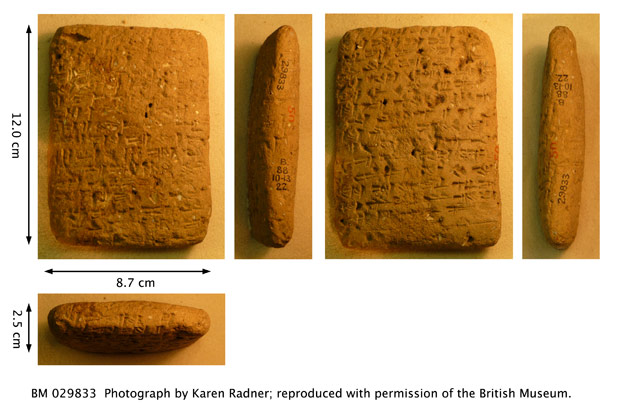BM 029833: letter from Yapahu of Gazru (Gezer) to the king of Egypt

BM 029833: letter from Yapahu of Gazru (Gezer) to the king of Egypt (Amarna, Egypt, c.1340 BC). Photograph by Karen Radner; reproduced with permission of the British Museum. View large image.
This letter is part of the famous Amarna correspondence, excavated in pharaoh Akhnaton's capital city. The corpus is part of the New Kingdom state archives, more specifically the diplomatic letters exchanged with the rulers of Egypt PGP 's neighbour states in the Middle East such as Babylonia, Assyria and the Hittite kingdom as well as its vassal kings in the Levant. This letter belongs to the latter category.
The ruler of Gazru, corresponding to the site of Gezer in what is today Israel, informs his overlord, the pharaoh, that his younger brother has turned against him. While the letter is written in Akkadian and in the cuneiform script, neither would have found much praise in the core regions of the cuneiform world. The Akkadian is heavily influenced by the related, local Canaanite language, while the cuneiform characters were impressed not with a reed stylus but a wooden or metal writing tool which gives the signs their bulky appearance. Least impressive of all is the shape of the crudely fashioned tablet, which was made out of unrefined clay (note the small stone inclusions) and bears very little resemblance to the elegantly formed letters from Mesopotamia such as BM 023145.
View the record for this tablet on the British Museum's research database [http://www.britishmuseum.org/research/search_the_collection_database.aspx].
A translation of the text can be found in Moran, Amarna Letters (1992), p. 340 (= EA 298).
Content last modified on 31 Mar 2025.
Karen Radner
Karen Radner, 'BM 029833: letter from Yapahu of Gazru (Gezer) to the king of Egypt', Knowledge and Power, Higher Education Academy, 2025 [http://oracc.museum.upenn.edu/saao/knpp/CuneiformRevealed/Tabletgallery/BM029833/]